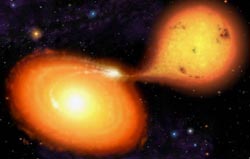
Astronomers led by the University of Colorado and Carnegie Observatories have shown that a miniature galaxy less than one-hundredth the size of the Milky Way is ejecting large quantities of gas and energy into huge regions of intergalactic space.
“This discovery suggests tiny galaxies that appear very faint and dormant today were once much brighter and more active,” said CU-Boulder graduate student Brian Keeney. “It also indicates similar galaxy systems may have been primarily responsible fo

Astronomers Steve Howell of the University of California, Riverside and Thomas E. Harrison and Heather Osborne of New Mexico State University have found from their observations of over a dozen mass-losing stars in ’cataclysmic variables’ that most of the secondary stars do not appear to be normal main sequence stars in terms of their apparent abundances. To various degrees, each star seems to have low to no carbon and other odd mixtures of elements such as sodium and calcium, the astronomer

Mice lacking only one copy of the gene for CD2-associated protein (CD2AP) appear to be significantly more susceptible to kidney disease and failure than normal mice. Moreover, the mutation appears to impair the elimination of proteins that accumulate in the kidney, a previously unidentified process.
The study, which will be published in the May 23 issue of the journal Science, is the first to suggest that proteins normally pass into the kidneys and that kidney disease may result from an ina

Scientists at Washington University School of Medicine in St. Louis have gained new insights into the causes of human deafness and balance disorders by studying the inner ear of chickens.
The research provides new clues as to why birds can replace critical cells in the inner ear and humans cannot. Loss of these so-called sensory hair cells in humans is a leading cause of deafness and impaired balance due to aging, infectious disease and exposure to loud noise. The study will be published in

A group of researchers from The Scripps Research Institute (TSRI) has solved structures of a bacterial protein called pilin, which is required for infection by pathogens that cause human diseases like meningitis, gonorrhea, diarrheal diseases, pneumonia, and cholera.
In the latest issue of the journal Molecular Cell, the TSRI group reports two key structures of these pilins and discoveries about their assembly into fibrous “pili.” Because a whole class of bacterial pathogens require the ass

Hydrothermal vents and cold seeps were discovered more than 20 years ago, yet remarkably little is known about the biodiversity of these chemosynthetic ecosystems. Deep-sea vents and seeps occur in very different geological settings, yet in both types of systems, microbial primary production supports an abundance of large invertebrates, such as giant tubeworms, clams, and mussels.
These animals in turn provide refuge for a diverse invertebrate fauna. Because seeps are considered to be more

– new calculation confirms standard model of particle physics. Contribution of hadronic vacuum polarization determined with unprecedented accuracy. The magnetic moment of the muon is an important precision parameter for…
Technique may prevent formation of unwanted waves that siphon off needed energy. Heating plasma to the ultra-high temperatures needed for fusion reactions requires more than turning the dial on a…

An international team of astronomers, led by researchers from the Astronomical Observatory of the University of Warsaw, have identified a new class of cosmic X-ray sources. The findings have been…

Antibody that Neutralizes Inhibitory Factors Involved in Nerve Regeneration Leads to Enhanced Motor Function after Acute Spinal Cord Injury. Researchers at 13 clinics in Germany, Switzerland, the Czech Republic and…

How the body’s natural killer cells could fight leukemia. Every year, some 13,000 people in Germany are diagnosed with leukemia. Despite intensive chemotherapy, around one in two of them die….

… eco-friendly reactor converts air and water into ammonia. Producing enough ammonia to feed the world comes with a large carbon footprint;. process described in new UB-led study could help…

How simulations help manufacturing of modern displays. Modern materials must be recyclable and sustainable. Consumer electronics is no exception, with organic light-emitting diodes (OLEDs) taking over modern televisions and portable…

“Neurons that fire together, wire together” describes the neural plasticity seen in human brains, but neurons grown in a dish don’t seem to follow these rules. Neurons that are cultured…

The quest for sustainable energy solutions has been a major focus of scientific research for decades. Solar energy, a clean and renewable source, has emerged as a promising alternative to…

With a processing speed a billion times faster than nature, chip-based laser neuron could help advance AI tasks such as pattern recognition and sequence prediction. Researchers have developed a laser-based…

New technology could remotely identify various types of plastics, offering a valuable tool for future monitoring and analysis of oceanic plastic pollution. Researchers have developed a new hyperspectral Raman imaging…

Artificial Intelligence (AI) has established a strong presence across industries, large and small. The “VoBaKI” research project has empowered small and medium-sized enterprises (SMEs) with an innovative tool to independently…